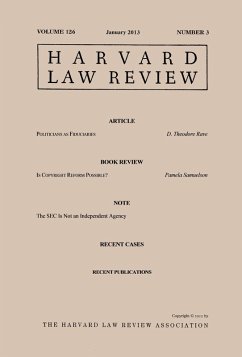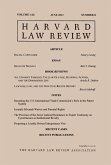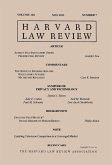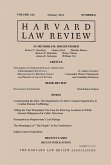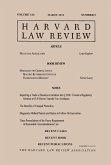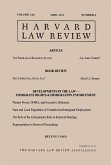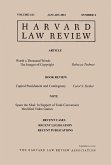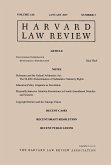Article, "Politicians as Fiduciaries," by D. Theodore Rave
Book Review, "Is Copyright Reform Possible?" by Pamela Samuelson
Note, "The SEC Is Not an Independent Agency"
In addition, student research explores Recent Cases on the Fourth Amendment implications of "pinging" a GPS signal on a cellphone, the First Amendment and mandatory tobacco graphic warnings, the First Amendment and police impersonation statutes, whether software method claims are patent ineligible, defamation law and the changing "per se" status of alleging someone is gay, habeas review under AEDPA, and class action certification for illegal stops and frisks. Finally, the issue includes several surveys of Recent Publications.
The Harvard Law Review is a student-run organization whose primary purpose is to publish a journal of legal scholarship. Aside from serving as an important academic forum for legal scholarship, the Review has two other goals. First, the journal is designed to be an effective research tool for practicing lawyers and students of the law. Second, it provides opportunities for Review members to develop their own editing and writing skills. Accordingly, each issue contains pieces by student editors as well as outside authors. The Review generally publishes articles by professors, judges, and practitioners and solicits reviews of important recent books from recognized experts. Most student writing takes the form of Notes, Recent Cases, Recent Legislation, and Book Notes.
This issue of the Harvard Law Review is January 2013, the third issue of academic year 2012-2013 (Volume 126).
Dieser Download kann aus rechtlichen Gründen nur mit Rechnungsadresse in A, B, CY, CZ, D, DK, EW, E, FIN, F, GR, H, IRL, I, LT, L, LR, M, NL, PL, P, R, S, SLO, SK ausgeliefert werden.

